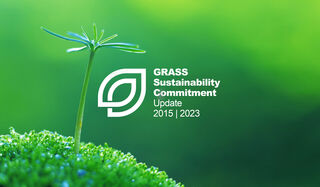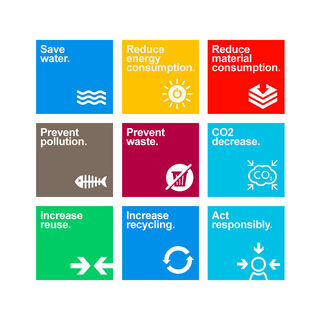Sustainability
Movement is green.
We see the present as part of the future. For us, environmental protection therefore is an important prerequisite for sustainable company success. Working with this mindset means conserving resources and creating ecologically sound production conditions. We work on this every single day.
PERSONAL RESPONSIBILITY
Since the end of 2010, the GRASS Group has been certified in accordance with the ISO 14001 international standard for environmental management systems. However, our high level of environmental awareness and projects built on this go back many years. Taking personal responsibility is part of our identity.

“Sustainability is a top priority for GRASS. That's why we strive to keep our environmental footprint as small as possible.”
Helmut Kainrad
CEO GRASS-Group
Sustainability Commitment
Sustainable measures that have an impact.
0 1 2 3 4 5 6 7 0 1 2 3 4 5 %
Green energy.
75 percent of energy demand at the Höchst site is met by our own combined heat and power plant.
636 t
As a result of wide-ranging energy efficiency measures, CO2 emissions have been reduced by 636 tons per year.
100% of steel waste generated during production is recycled.
11 m kWh
Annual power consumption has been reduced by 11 million kW/h. This corresponds to an average annual consumption of around 2500 single-family homes.
0 1 2 3 4 5 0 %
waste reduction.
The volume of non-recyclable waste was reduced by 50% per year.
Heat recovery through compressor and exhaust gas heat exchange systems with a total output of more than 3,000 kW.
30 electric charging stations. For the increasing number of electric vehicles
0 1 0 1 0 1 2 3 4 0
Solar panels
with an output of 421kWp generate around 400,000 kWh of electricity every year. This means that we generate more than 70% of our electricity requirements ourselves and also avoid around 200 tonnes of CO2 emissions.
Sustainable products
It's not just in production that we are treading new, sustainable ground. Our drawer systems are almost 100 percent recyclable and contain no hazardous materials or substances listed in the REACH regulation.
The most sustainable products are those that are used, reused, reconditioned and recycled for as long as possible. In this respect, GRASS movement systems are already among the most climate-neutral components of all, because they last for the lifetime of the furniture. And movement systems shouldn’t need maintenance or repair if properly looked after. But that's not all. Integrating the entire cycle into a sustainability concept – from the production and supply of our movement systems to their use and eventual disposal/recycling – is one of the strategic goals of GRASS.
This also means supplying to this cycle only substances that are replaceable and/or biologically degradable or entirely recyclable in their natural life cycles. In this way, for example, we have developed in Vionaro V8 a sustainable drawer system which not only can be produced and coated in an environmentally friendly manner, but whose materials can also be recycled by material type. The concept of the world's first all-metal drawer side resulted from this. Consequently, we have completely dispensed with plastic elements, foams and adhesives in pursuit of robustness, sustainability and recyclability. We are convinced that climate protection begins with the small things. And with the V8 Slim Drawer System, every consumer can make a contribution.
Vionaro V8
Every component of the Vionaro V8 Slim Drawer System is made from steel and the system is assembled using state-of-the-art laser welding technology. That creates maximum strength and longevity while ensuring an almost 100 percent recycling rate.
Sustainable Surfaces
The new effect powder coatings from GRASS are sustainable high-tech surfaces for more climate protection.
The coating process exclusively uses solvent-free, energy-saving, low-temperature powder coatings with significantly reduced curing and throughput times. Furthermore, loss of coating material can be largely avoided by recovering coating powder that is not retained on the product, known as overspray. This saves energy, resources and protects the environment.
Sustainable is the new normal.

Internal standards, test procedures based on DIN ISO and tests by independent institutes ensure systematic quality assurance.
